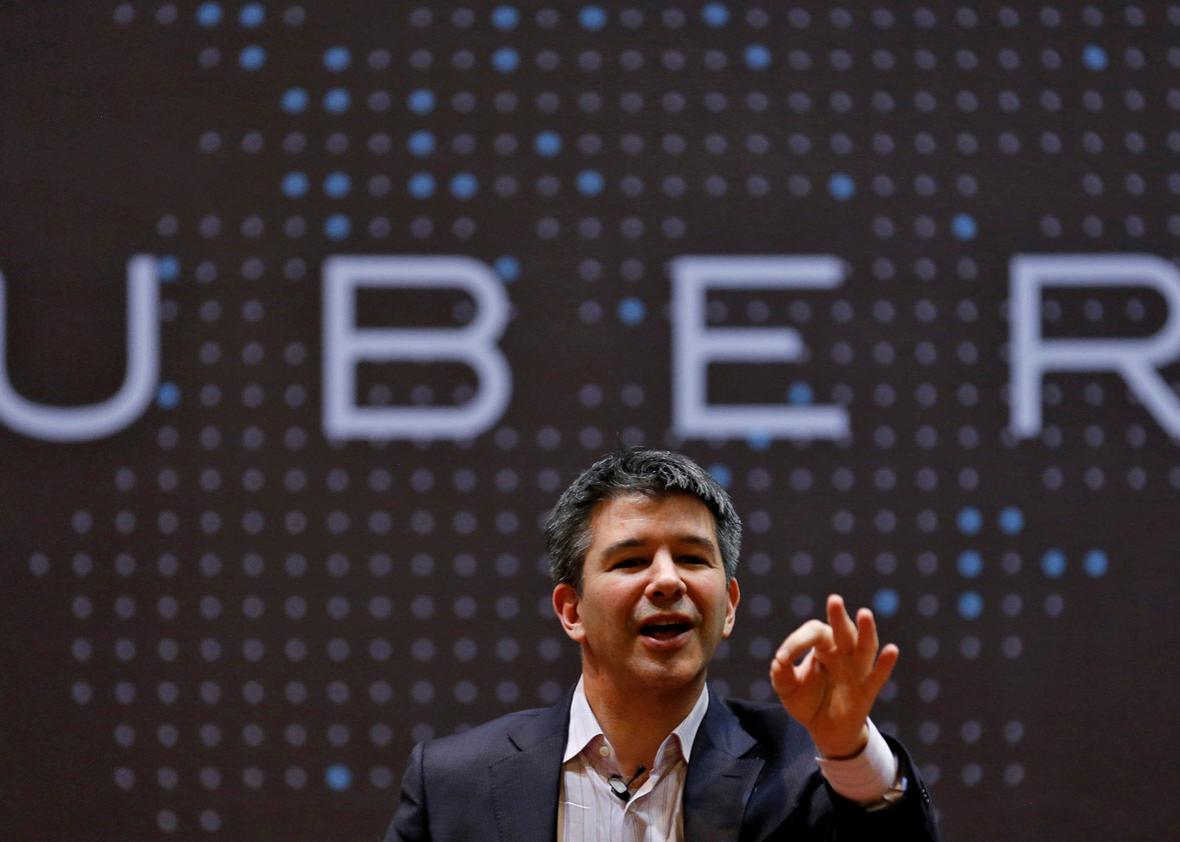It has been an exceptionally rough stretch for Uber. The company is ensnared in litigation with Google over its autonomous car efforts. In February, former Uber engineer Susan Fowler’s searing post documented a toxic and hostile culture for women at the company. CEO Travis Kalanick, who earlier this year conceded the need to improve his combative style of leadership, has suffered personal tragedy (his mother was killed and his father injured in a boat accident last month). For a brief period in the wake of the London Bridge attack, Uber had surge pricing in effect—hardly the first time the company has exposed itself to accusations of exploiting tragedy.
In advance of a report on Uber’s culture that the company had commissioned from former Attorney General Eric Holder, Uber fired 20 employees for harassment, discrimination, and other offenses. The company’s board met over the weekend to assess the situation and is reportedly considering whether Kalanick should take a leave of absence. Eric Alexander, who ran the company’s Asia Pacific business, was fired, as Recode reported, after he “obtained medical records of a woman who had been raped during a ride in India” and they were shown to other executives at the company. And on Monday, Emil Michael, a senior vice president of business at Uber, left the company.
How could a company that is in many ways enormously effective at complex business processes—the app is a wonder, the business model is brilliant, it has a $69 billion valuation—flounder when it comes to comparatively simple business processes like having effective anti–sexual harassment policies?
The answer, in part, is that many of Uber’s problems share a particular attribute with its successes. As a “platform” company, Uber has taken the idea of outsourcing to its logical conclusions. It has outsourced the ownership of the vehicles in its massive virtual “fleets” to the driver on its app. It doesn’t directly employ these people but rather treats them as contractors or partners—so it’s outsourcing the labor, too. Uber doesn’t manually set prices for its rides but lets the algorithms do the unpopular work of jacking up fares during times of heavy use. The ultimate goal, and a factor underlying its massive valuation, is that Uber may one day outsource the very concept of human labor as it works to develop self-driving cars.
Outsourcing, historically, has been a quick and cheap way to get the expertise or access to assets you may need without having to pay for them. The upside? It’s a very cheap way to scale a business, and it spares you the chore of building excellence in a range of disciplines. If you’re great at writing code and creating a great user interface, you don’t have to be great at managing actual car fleets or running payroll for millions of employees to build a business.
The problem? Done too much—or done poorly or recklessly—outsourcing can slow down your ability to scale. Operating a Fortune 500 company means you have to buy into a certain level of organizational theory. If you want to run, and keep growing, a global operation with loads of workers that operates in regulated industries, then you have to build up teams of skilled, experienced executives who are good at, say, applying for licenses, or striking business development deals, or creating and managing a workplace culture. Sure, it’s bureaucratic and boring and uncool. But it’s necessary. When you have a setback, or when a shortcoming is revealed, you build a team of professionals whose entire job it is to tackle the problem. You can’t outsource everything.
As the company has run into problems—a lack of controls, an admitted lack of leadership capabilities and lack of maturity on Kalanick’s part, a lack of a constructive culture—Uber has attempted to solve them via outsourcing. Rather than kick himself upstairs and hire a chief executive officer with operating chops, Kalanick this spring said he would hire a chief operating officer. Rather than moving aggressively to make the corporate culture and its operations more mindful, Kalanick added mindfulness guru Arianna Huffington to its board, which is a little like appointing a celebrity chef as an adviser while not bothering to staff the cafeteria with food-service professionals. In that decision and others, the company’s moves won’t change the experience for everyday employees. Rather than build up a tough compliance function that would signal a zero-tolerance policy for certain types of behavior, Uber outsourced the task to Eric Holder.
Now Uber is reaping the whirlwind: executive departures, new demands from stakeholders for better processes, and a slowdown in the autonomous driving efforts—all factors that will slow down Uber’s ability to scale.
Uber might be well-advised to take a cue from Facebook and Google, two founder-controlled platform companies that experienced insanely rapid growth and then transformed into insanely profitable businesses. There came a point in the evolution of both companies where the founders decided they needed to bring in professional managers from outside their age and business demographic—Sheryl Sandberg in the case of Facebook and Eric Schmidt at Google—and then empower them to run the companies like conventional businesses.
Going forward, the company built on outsourcing needs to insource a bunch of key disciplines and capabilities. That may mean fixing its ugly culture by gutting the company’s C-suite. It certainly means a no-tolerance policy for sexual harassment. And it will mean a different way of doing business going forward. However this change happens, it’s time for Uber to get over the idea that it’s not a normal company.
